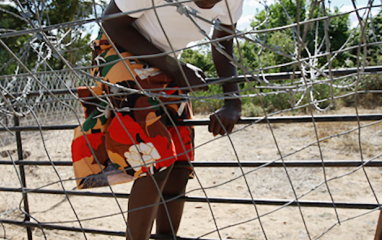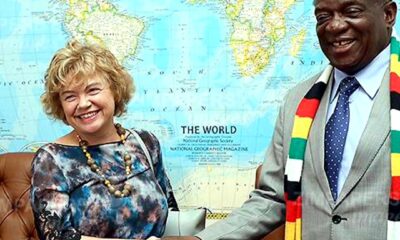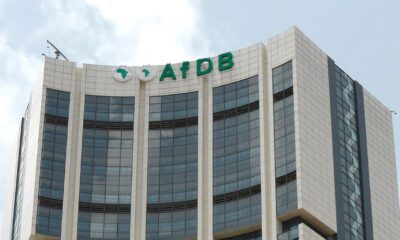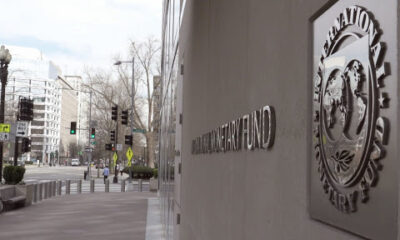
Business
Massive debt burden weighs heavily on Zim
Published
3 years agoon
By
NewsHawksIN the past week, research analysts have predicted that Zimbabwe will struggle to settle its debt this year with arrears weighing heavily on the country which has been in debt distress for years. According to the 2021 National Budget, external debt stood at US$8.02 billion as at September 2020, with domestic debt pegged at ZW$1.547 billion. Our Reporter Merlin Garwe (MG) this week spoke to AFRODAD senior policy analyst Tirivangani Mutazu (TM) who says Zimbabwe’s debt situation is entangled in politics.
Below is the interview:
MG: Zimbabwe has remained in debt distress for a long time with market watchers having expressed fears that this year arrears might weigh heavily on the country as it has no capacity to service its debts. What is your comment?
TM: Zimbabwe’s debt crisis resolution is entangled in politics. It requires political negotiations between the country and its creditors.
Debt restructuring is very much linked to politics and the interests of creditors, especially the powerful shareholders in the international financial institutions such as the IMF (International Monetary Fund).
What happened to the envisaged bilateral loan to clear arrears to the World Bank Group? Why is it that it did not materialise?
Does the country have a re-engagement strategy with international institutions? We hear that concerns are being raised about governance, corruption, human and property rights. What are the government’s incentives for reform?
Zimbabwe has been struggling to repay its external debt since 2001 which resulted in multilateral institutions such as the IMF and World Bank suspending further disbursements and new loans. Since then, arrears on both principal and interest payments on external debt have been accumulating and interest compounding.
As of September 2020, total external debt was US$8.2 billion of which 77% (US$6.34 billion) are arrears. This chokes economic growth and increases country risk for new investment.
The government spent ZW$378.5 million on interest payment for government debt in 2019 and in 2020 they anticipated spending ZW$1 billion mainly servicing domestic debt which as of 30 September 2020 was ZW$12.5 billion.
The government has been using inflation and exchange rate to reduce its domestic debt. Token payments have been made towards servicing active external debts.
With Covid-19 reducing government revenue through disruptions in production and exports, it seems to be clear that the government revenue is severely constrained in the face of additional expenditures to fight Covid-19, procuring the vaccine and stimulating the economy.
MG: What can you say about Zimbabwe’s debt status and the country’s economic performance?
TM: Public debt can be used to stimulate economic growth and human development but it depends on the conditions by the creditor and the productive use by the borrower.
Between 2010 and 2019, about 53% of borrowed loans were allocated to fuel and power sectors. The fuel sector was heavily subsidised.
While power imports were crucial, these resources were not used for generating more revenue since the subsidised fuel was monopolised by a few.
This then creates a further challenge when such loans mature. Government loans are usually borrowed against anticipated high economic growth rates which will then be used to service the loans without affecting allocations to other important sectors.
There is a threshold level of debt-to-GDP level which, when exceeded, the debt will start to have negative effects on economic growth.
The Sadc region set the level at 60% of GDP while in Zimbabwe the Public Debt Act sets the limit at 70% of GDP but as AFRODAD our African Borrowing Charter sets the ceiling at 50% of GDP.
The National Budget statement if 2021 estimated that public debt by end of 2020 was at 78% of GDP, which is well above the thresholds set and parliament did not approve the ratio to be exceeded.
Transparency and accountability are still a big issue in the contracting and utilisation of borrowed funds.
Some sections of the Zimbabwean community estimate the external debt to be well above US$20 billion due to some loans which are acquired secretly without following the legislation.
A case in point is the Afreximbank loan which the minister (of Finance) was forced to gazette recently.
There is also speculation that there are huge loans which were acquired and backed by mineral resources of this country but outside the purview of parliament.
Zimbabwe has for several years been ranked by Transparency International as one of the countries with high level of corruption, which may imply that the tendering processes in some of the projects funded by borrowed money may have been corruptly awarded, which affects performance of the project.
MG: AFRODAD and other civil society organisations have repeatedly pushed for the government to address the issue of public debt. What have been the key sticking issues in your quest?
TM: The government has come up with a number of strategies in an effort to resolve the debt overhang which is affecting economic growth.
In 2011, government adopted the Zimbabwe Accelerated Arrears Clearance, Debt and development Strategy (ZAADDS) to deal with the country’s arrears and debt overhang, as well as laying a solid foundation for economic growth supported by investment from both domestic and external resources.
ZAADDS was a hybrid debt resolution strategy, which entailed adoption of traditional debt resolution initiatives combined with leveraging the country’s natural resources to achieve sustainable economic development.
In 2012, government adopted the Accelerated Re-engagement Economic Programme (ZAREP) to prepare for eventual arrears clearance and debt relief by establishing a track record of sound macro-economic management in the context of the IMF’s Staff-Monitored Programme (SMP), which was approved in 2013.
In 2015, another plan was developed, the Strategy for Clearing External Arrears and Supportive Economic Reform Measures, to clear external arrears to the international financial institutions.
The strategy entailed repayment of the IMF arrears (US$120 million) using Zimbabwe’s SDR (Special Drawing Rights) resources at the fund, repayment of US$896 million IBRD (International Bank for Reconstruction and Development) arrears using a term facility syndicated by the African Export and Import Bank (Afreximbank) and Lazard Freres, and repayment of US$260 million and US$601 million IDA (International Development Association) and AfDB (African Development Bank) arrears respectively, with a bridging facility from Afreximbank.
In late 2016, government cleared its arrears to the IMF, and allowing the country’s PRGT (Poverty Reduction and Growth Trust) eligibility to be restored and the declaration of non-cooperation to be lifted.
The government further adopted an agenda focused on macro-economic stabilisation and reforms supported by an IMF Staff-Monitored Programme adopted in May 2019, the IMF has since declared the reforms off-track, due to delays and missteps in implementation.
The Medium-Term Debt Management Strategy (2017-2021) has remained largely unimplemented. The decades of isolation have created further problems for the economy.
For the international community, re-engagement has become tied to improvements needed in governance, human rights, land tenure security, and electoral reforms.
The process of reaching political agreement on normalisation will require the country, and the international community, to confront and reconcile the existing disconnect and many of the predetermined narratives that have been forged over the years.
The clearing of arrears also requires reaching agreement with IFIs on a range of reforms which require government to demonstrate its commitment to implement, as the country seeks to normalise relations and benefit from access to international markets in a rapidly changing global context.
Critical offshore credit facilities contracted by the private sector will remain expensive on account of perceived country risk, and foreign direct investment inflows subdued due to depressed investor confidence and unfavourable business environment.
Reforms, if managed with support from the IMF and the World Bank, will boost market confidence, private sector investment and unlock new, fresh lines of credit.
Debt relief can be a reality with the commitment of government and stakeholders in implementing sound reforms.
MG: There has been concern that the issue of debt is too complicated for the ordinary citizen who bears the burden of the debt at the end of the day. What efforts have been made to ensure this issue is understood by everyone?
TM: AFRODAD works with national debt coalitions in many of the countries where we implement interventions. In Zimbabwe, we work closely with ZIMCODD (Zimbabwe Coalition on Debt and Development).
ZIMCODD has many effective programmes on debt where it demystifies and simplifies debt issues for an ordinary man who bears the burden of the debt to understand and relate to.
The strategies used are debt awareness campaigns, provincial debt policy dialogues, summer schools, university programmes, community indabas and radio programmes.
MG: Do you think there is a link between inability to service debts and high levels of corruption in Zimbabwe?
TM: Corruption has been shown to increase public debt as loans are contracted without approval of parliament secretly and only emerge when debt servicing falls due.
Loans may also be diverted from their original use to benefit individuals. Under these two circumstances, illegitimate debt or odious debt emerge as a result of corruption.
For instance, Farm mechanisation which was then assumed by government through the RBZ Debt Assumption Bill saw US$1.35 billion being placed on citizens who did not benefit from the arrangement.
Corruption reduces domestic resource mobilisation through tax avoidance or paying lower taxes.
Zimra (Zimbabwe Revenue Authority) tax compliance is at about 30% which implies that significant revenue is lost through bribes and tax avoidance.
Africa is estimated to lose over US$50 billion annually due to illicit financial flows. These illicit financial flows are more in countries that export commodities and such flows are also high in countries with high levels of corruption.
This essentially limits the ability of a country to service its debts due to deprivation to domestic revenues.
Parastatals have often been used by politicians to siphon resources from government and such debts will be transferred to government when the company faces viability challenges.
Public procurement is also another area where corruption is rife. Procurement in the public sector is about 10% to 15 % of GDP (World Trade Organisation) and corruption consumes about between 10%-30% of cost of capital for the project (Transparency International, 2020).
Such huge loss in resources for a project has negative implications on the performance of the project.
MG: Do you see Zimbabwe being able to clear its external debts in the near future?
TM: No country will be in debt distress forever. Creditors need their monies, so debt resolution solutions need to be found somewhere.
The hurdles to Zimbabwe being able to clear its external debts in the near future are largely political.
The clearance of external debt arears very much depends on re-engagement with the creditors and Western countries’ economic and political reform demands on Zimbabwe.
Internally, the government must continue to address corruption and strengthen economic governance.
The country should tap into the new international debt relief initiatives brought by the Covid-19 pandemic.
Firstly there is the Debt Service Suspension Initiative (DSSI) endorsed by the IMF, World Bank’s development committee and G20 Finance to help developing countries manage the severe impact of the Covid-19 pandemic.
The main goal of the DSSI is to allow poor countries to concentrate their resources on fighting the pandemic and safeguarding the lives and livelihoods of millions of the most vulnerable people than service debts.
Secondly the G20 came up with the “Common Framework for Debt Treatment beyond the DSSI”. Under this framework, debtor countries need to negotiate with individual creditors.
A number of African countries have requested for debt restructuring under the framework. These include Chad, Zambia and Ethiopia.
Projections are high that a record number of African countries already faced with record-high debt levels request for inclusion.
The G20 framework is a welcome arrangement but the best outcome will be achieved through win-win transparent negotiations accompanied by prudent financial management and the institution of fiscal discipline by African governments.
As you know Covid-19 has generated an economic recession in the Africa region and further exacerbated the negative effects caused by a collapse in global commodity prices, a collapse in tourism and a collapse in remittances?
These multiple economic shocks have deepened the profound sovereign debt crisis. Many African countries are already in receipt of IMF bailouts, and more countries are seeking debt relief.
Zimbabwe needs debt relief in order to support the expansion of healthcare and social protection in the face of Covid-19 and to accelerate the implementation of national development plans and the SDGs ( Sustainable Development Goals).
MG: Should the country manage to clear its debts, what is your comment on issues of confidence when it comes to the multilateral lenders?
TM: The government somehow might have lost the confidence of the multilateral lenders such as the IMF and World Bank.
An IMF Staff-Monitored Programme adopted in May 2019 has since declared the reforms off-track, due to delays and missteps in implementation.
The government needs to take economic policy measures which will build the trust and confidence of all lenders.
Coming from a civil society perspective, multilateral lenders, especially the IMF, have their share of problems.
In Africa, the IMF has a history of pain and anguish among the citizens as a result of poor economic policy advice through the economic structural adjustment programmes in the 1980/90s.
The African citizens lost confidence in the lender, even up to today. Currently, a number of African countries on an IMF programme are implementing economic austerity measures that do not sit very well with the citizens.
MG: What strategies do you think Zimbabwe needs to employ to manage its existing and future debts?
TM: There is a need for a debt resolution mechanism – government needs to engage its creditors and clear the arrears to the World Bank and AfDB as a matter of urgency. This will unlock prospects for debt restructuring.
There is a need for a comprehensive debt audit to determine what is legitimately owed by Zimbabweans and if odious debts are identified legal action should be taken as in the case of Mozambique so that those who benefitted from the loans repay.
There should be responsible borrowing. Loans should be borrowed for priority and productive projects and parliament should approve all loans before they are contracted.
Compliance with national debt legislative frameworks is key. Any unsanctioned breaches must be punished.
Government needs to continue improving fiscal governance and aggressively fighting corruption.Illicit financial flows should be curbed through implementing recommendations of the Mbeki Report on Illicit Financial Flows and government should join the Extractive Industry Transparency Initiative (EITI).
Debt transparency and accountability should be improved to instill confidence again in the lenders and citizens.
MG: Going forward, what is your game plan around debt issues in Zimbabwe and other countries you work in?
TM: As a regional organisation and think-tank, we seek to influence African government policies on public debts – contraction, management and resolution.
We therefore work very closely with the government of Zimbabwe through engagements with the ministry of Finance, Debt Management Office, and parliament, especially portfolio committees on Public Accounts and committee on Finance and Budget and other key stakeholders on the debt issue.
Zimbabwe is in debt distress. Our advice borders around what debt resolutions mechanisms or options are available for the government to get out of this debt crisis.
The country needs to clear it arears. AFRODAD research shows that the majority of African countries went through many debt restructuring episodes: Highly Indebted Poor Countries, Multilateral Debt Relief Initiative, Paris Club Rescheduling and many more. We bring that analysis to the table for government to learn from.
AFRODAD, jointly with ZIMCODD, organise and host an annual debt conference running into third year this year.
This multi-stakeholder conference is key for our engagements and pursuit to find lasting solutions to the debt crisis the country is facing.
We have managed to bring government policymakers to the conference and we are quite confident some of our debt policy recommendations will find their way into official policy documents and get implemented.
We urge government to: engage in responsible borrowing behaviours; reduce the recourse to collateralised external borrowing; put in place a debt management framework; be transparent with debt information; debt relief is a political process; aim for a win-win outcome; and do not undermine parliament’s debt management roles.
You may like
-


South Africa won’t become Zim — but it has serious problems
-


Epic naivete of British policy on Zim
-


Only southern African nation with huge continental arrears
-


Debt-saddled government resumes talks with creditors
-


Depressed platinum prices dent US$400m Afreximbank loan repayment
-


Reform solution for debt crisis








